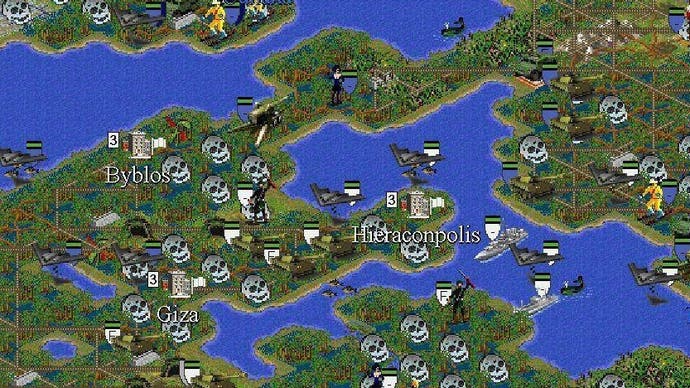How ideas of civilisation have shaped gaming
Level progression.
When I was a kid, I played a lot of Civilization 2. I played a lot of strategy games in general, but having a deep love of both history and sci-fi, the epic sweep of Civ 2 from prehistory to the stars held a particular appeal. I loved taking my little people from their huts and ziggurats to the world of science and advanced space-flight.
But there was something that always bugged me. It didn't matter who you played as, when you hit a certain point all those lovely ziggurats and castles and pagodas vanished and were replaced by grey, blocky skyscrapers. You hit the modern age and everything looked like America. At the time I think it bothered me because what I loved about the game was stepping into a historical culture for a few hours. Once everything homogenised it didn't really matter whether you were the Aztecs or the Sioux or the Carthaginians - they were just names slapped over civilisations that all looked kind of the same.
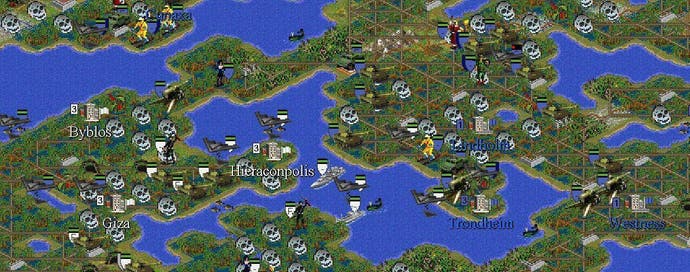
Of course, we could put that down to the graphical limitations of the time. But it also illustrates a particular idea of how civilisation works that's incredibly pervasive despite being basically wrong. From at least the nineteenth century onward, historians, anthropologists and social theorists thought in terms of Progress. Even if it wasn't spelt with that capital P, you can feel it in their confident, forward-striding conviction that history is a narrative about things generally getting better and that they were the people to define what 'better' meant. That's not to say there wasn't the odd setback along the way, of course. Rome fell, people took a few steps back before regathering themselves and marching forward once again. History was a story of things getting more and more complex; more and more 'modern'. And like in Civilization the game, the 'modern' looked like us.
Along with this went the idea that there are particular stages or levels that human societies progress through. Anthropologists would draw ladders with 'bands', 'tribes', 'chiefdoms' and 'states'. Societies were thought to move up and down this ladder as they progressed or regressed. And of course, as a good Victorian or Edwardian imperialist, once you've got all these categories, you can start placing all the societies you find around the world on your neat ladder, deciding which ones are 'more advanced' and which ones are less. And naturally, the less advanced can rightly be taken under the wing of the more advanced.
This kind of thinking permeated the mainstream. It's there in famous quips like the one about America being the only country in the world to go from barbarism to decadence without passing through civilisation (variously attributed to Churchill, Oscar Wilde, George Bernard Shaw and others), or in how we think about future civilisations. In 1964, for example, the astrophysicist Nikolai Kardashev laid out a scale for categorising civilisations on a galactic scale, based on how much, and how efficiently, they use energy. In a less scientifically worked-out version, it's there every time you hear a sci-fi character talk about a 'more advanced' alien civilisation.
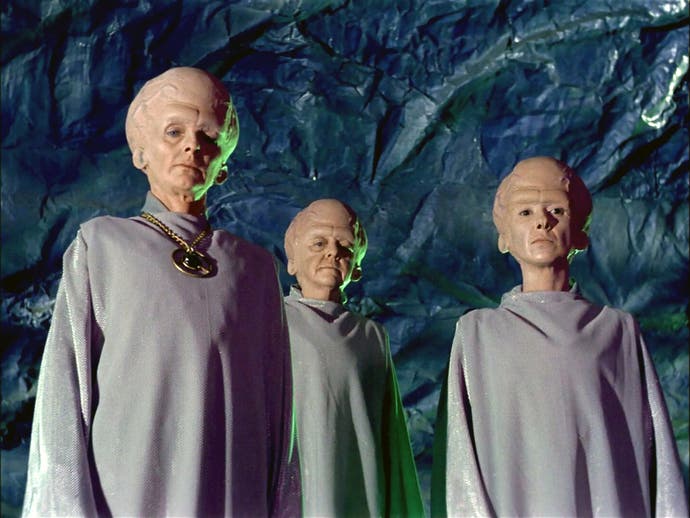
It's not surprise at all to find this kind of thinking in the background of a game like Civilization. But it's not just there in strategy games that deal with the big picture of human history. It's also a thread that runs through science fiction and underpins the kinds of future worlds games and other media imagine.
Broadly speaking, there are two main types of future games offer us. The first lot are those where society has developed more or less without interruption from our present - like Mass Effect or Deus Ex or Call of Duty: Advanced Warfare or countless others. Let's call these 'Progress Futures'. On the other hand we have the futures where humanity's taken a tumble and we're in a post-apocalyptic world. Fallout, The Last of Us, Horizon Zero Dawn... you know the drill.
Both these visions of the future incorporate aspects of the kind of thinking we've been talking about. The Progress Futures extrapolate based on western modernity, and throw in new technologies or aliens, but they very rarely offer any fundamental changes to the way society or culture works. We see the same jobs, the same political and military structures, the same way people interact with each other. Rather it's just more of everything - more technology, more capitalism, more inequality, more opportunity - based on which aspects of modern western society the developers are interested in.
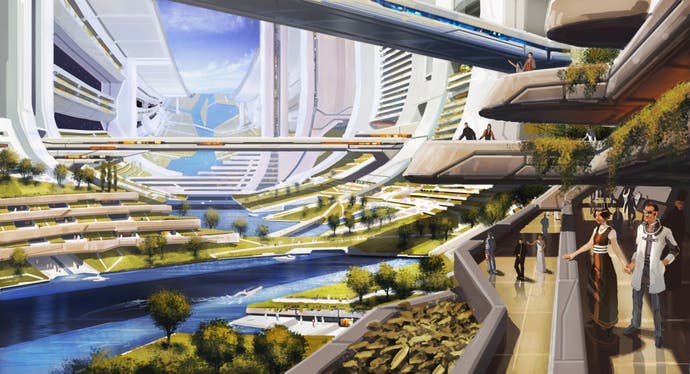
There's an implicit assumption that western modernity is a sort of pinnacle, and that the future will look like us, but more so. True, cyberpunk often nods visually to East Asia, but that's more of a post-Blade Runner genre production design cliché than an attempt to extrapolate a future based on actual society or culture there. Even then, it's capitalist, neoliberal Japan which is the main touchstone. This approach to futurism isn't unique to games, but literary science fiction is starting to do a better job at building futures that extrapolate from other cultures within the modern world. Afrofuturism is growing as a genre, with work from Nnedi Okorafor, N. K. Jemison, Lauren Beukes and many more. The Northern Irish writer Ian McDonald has built a niche for himself offering futures focusing on places outside mainstream western 'modernity', from India and Pakistan to Brazil. And there are writers like Iain M. Banks or Ursula LeGuin, who have tried to imagine radically different future or alien societies.
The post-apocalyptic genre explores the counterpart of this idea of progress: the notion of collapse. The basic assumption is that a crisis or upheaval can cause a society to slip down to an earlier phase on the ladder of social evolution. So if you're in a modern nation-state, you might slip back to a chiefdom or tribe-based society. From Mad Max to Fallout to Horizon: Zero Dawn, tribes and chiefdoms are so much a cliche of post-apocalyptic dystopias that we don't question it. We're used to seeing survivors huddled together and dominated by whatever charismatic smooth-talker or successful warlord comes along. Often, like old-fashioned anthropologists, developers draw from real societies to help imagine what these kinds of civilisation look like. So the societies of Horizon: Zero Dawn look like a mish-mash of Native American traditions and other tribal cliches.
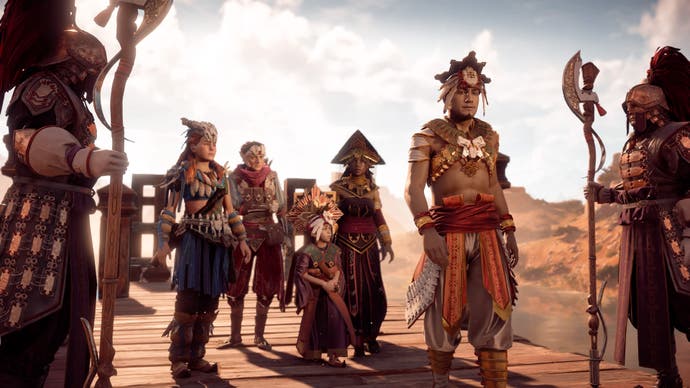
The problem with all this is that history and society don't work in straight lines. There isn't a single ladder you move up and down. The 'modern age' doesn't look like America. It looks like America and China and Europe and Nigeria and the last remaining uncontacted tribes deep in the Amazon. There's nothing in history to suggest that all societies pass through the same stages, or that one 'tribe' really has much in common with another. While they can be helpful, these kind of labels obscure the diversity of cultures and ways of organising societies under bland, familiar facades. Just like those Civ 2 city icons.
In fact, I think there's something fundamentally video gamey about the whole thing. It talks about 'stages' or 'levels' of civilisation, of 'progress', 'success' or 'failure', as if civilisation has a goal and a win-condition (build your rocket to Alpha Centauri!). But if it's a game, it's a game of a certain era. Linear, prescriptive and where if you die you go back to the last checkpoint. Skills are unlocked by progressing through defined levels, not through a branching tree (you levelled up to modernity; capitalism unlocked!).
These days, many archaeologists and anthropologists talk about 'social change' rather than 'progress', they think about the ways societies are similar and different, and different ways there are of being 'modern' or 'ancient'. The game of civilisation's turned its back on levels.
It's gone open-world.
